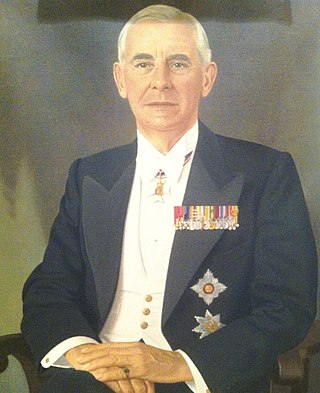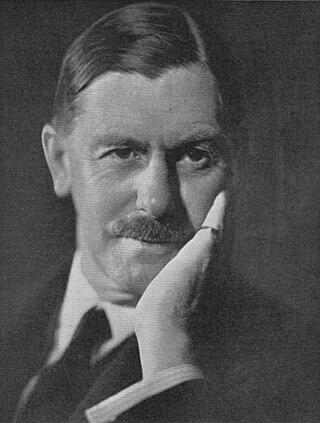
Sir Reginald Stephen Garfield Todd was a liberal Prime Minister of Southern Rhodesia from 1953 to 1958 and later became an opponent of white minority rule in Rhodesia.

John James Wrathall, was a British-born Rhodesian politician. He was the last white President of Rhodesia. He formerly worked as a chartered accountant.
General elections were held in Southern Rhodesia on 7 November 1934, fourth elections since the colony of Southern Rhodesia was granted self-government. The elections were called only a year after the previous elections when the Prime Minister, Godfrey Huggins, formed the United Party as a merger of the conservative section of his Reform Party and the former governing Rhodesia Party. Huggins succeeded in winning a landslide, defeating all but one of his Reform Party opponents.
General elections were held in Southern Rhodesia on 14 April 1939, the fifth elections since the colony of Southern Rhodesia was granted internal self-government. Prime Minister Godfrey Huggins' United Party government were re-elected in a landslide. The elections were called slightly earlier than the deadline as Huggins feared the German invasion of Czechoslovakia would lead to European War.

The Rhodesia Labour Party was a political party which existed in Southern Rhodesia from 1923 until the 1950s. Originally formed on the model of the British Labour Party from trade unions and being especially dominated by railway workers, it formed the main opposition party from 1934 to 1946. The party suffered a catastrophic split during the Second World War and lost all its seats, and a further split over the attitude to the Federation of Rhodesia and Nyasaland ended its involvement in Rhodesian politics.
General elections were held in Southern Rhodesia on 25 April 1946, seven years after the previous elections in 1939, the term of the Southern Rhodesian Legislative Assembly having been extended so that there would be no general elections during World War II. The elections showed a strong shift to the right, as the United Party government led by Prime Minister Godfrey Huggins lost its overall majority; however, Huggins could count on the support of one of the factions of the Rhodesia Labour Party in any vote of confidence and therefore remained in office.
General elections were held in Southern Rhodesia on 15 September 1948. They saw Prime Minister Godfrey Huggins regain the overall majority he had lost in the previous elections in 1946. Huggins' United Party won a landslide, reducing the opposition Liberal Party to a small minority.
The Rt Hon. Sir Robert Clarkson Tredgold, KCMG, PC, was a Rhodesian barrister, judge and politician.

The Federation of Rhodesia and Nyasaland, also known as the Central African Federation (CAF), was a colonial federation that consisted of three southern African territories: the self-governing British colony of Southern Rhodesia and the British protectorates of Northern Rhodesia and Nyasaland. It existed between 1953 to 1963.
The Responsible Government Association (RGA), called the Rhodesia Party from 1923, was a political party in Southern Rhodesia. Founded in 1917, it initially advocated responsible government for Southern Rhodesia within the British Empire, as opposed to incorporation into the Union of South Africa. When responsible government was achieved in 1923, the party became the governing Rhodesia Party. It endured until 1934, when it merged with the right wing of the Reform Party to create the United Party, which remained in power for 28 years afterwards, and was itself defunct by 1965.

Sir Ernest Lucas Guest was a Rhodesian politician, lawyer and soldier. He held senior ministerial positions in the government, most notably as Minister for Air during the Second World War.
Sir John Moore Caldicott was a Rhodesian government minister.
William John Harper was a politician, general contractor and Royal Air Force fighter pilot who served as a Cabinet minister in Rhodesia from 1962 to 1968, and signed that country's Unilateral Declaration of Independence (UDI) from Britain in 1965. Born into a prominent Anglo-Indian merchant family in Calcutta, Harper was educated in India and England and joined the RAF in 1937. He served as an officer throughout the Second World War and saw action as one of "The Few" in the Battle of Britain, during which he was wounded in action. Appalled by Britain's granting of independence to India in 1947, he emigrated to Rhodesia on retiring from the Air Force two years later.

Godfrey Martin Huggins, 1st Viscount Malvern, was a Rhodesian politician and physician. He served as the fourth Prime Minister of Southern Rhodesia from 1933 to 1953 and remained in office as the first Prime Minister of the Federation of Rhodesia and Nyasaland until October 1956, becoming the longest serving prime minister in British Commonwealth history, until 1961.
Harry Herbert Davies was a Southern Rhodesian Labour politician and Leader of the Opposition in the territory's Legislative Assembly from 1929 to 1944. Originally from Wales, he moved to Southern Rhodesia in 1920 and became an estate agent in Bulawayo. He ran for the Southern Rhodesian Labour Party in Bulawayo District in the 1924 general election, but was not elected. After standing successfully in Bulawayo South in the 1928 election, he sat in the Southern Rhodesian Legislative Assembly for 20 years. In 1929 he was elected leader of the Southern Rhodesian Labour Party, thereby becoming Leader of the Opposition, a post he held until 1944.
The Reform Party was a political party that was formed in Southern Rhodesia in 1932, which went on to form the government under Godfrey Huggins in 1933, before splitting in 1934 and disappearing by the end of the decade. The party had support from disenchanted Rhodesian settlers including "railway men, civil servants, artisans without a job and farmers in economic distress." Its initial program proposed the creation of a central bank to regulate the colony's currency and credit and other measures to provide economic support for white workers and farmers facing competition from low paid African workers and manufacturers facing competition from cheaper South African imports.
John Godfrey Huggins, 2nd Viscount Malvern of Rhodesia and of Bexley was a British peer and officer in the Royal Air Force during the Second World War. He was a member of the House of Lords from 1971 until his death in 1978.
Jacob Hendrik Smit, CMG was a Southern Rhodesian merchant and politician. Born in the Netherlands, Smit migrated to Rhodesia and traded as a merchant, before becoming Southern Rhodesia's Minister of Finance in 1933. Orthodox in his economic policies, Smit resigned from Godfrey Huggins' government in 1942 and later formed the right-wing Liberal Party. He was Southern Rhodesia's Leader of the Opposition from 1946 to 1948, when he lost his seat.






